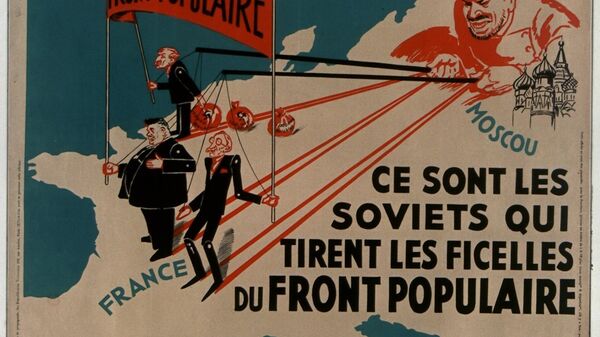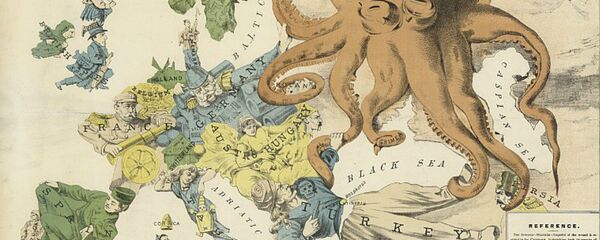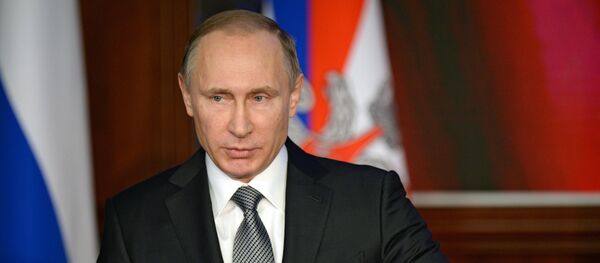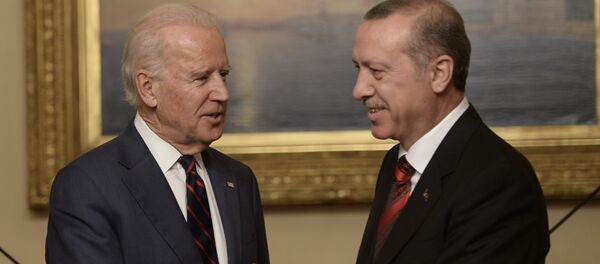Washington, the reports suggested, has been growing increasingly concerned over Moscow's supposed use of clandestine influence to undermine NATO, US missile defense, and Europe's anti-Russian sanctions policy.
What are these secret operations? According to The Telegraph, they include the funding of political parties, charities, and NGOs, contacts between European politicians and their Russian counterparts, and attempts to stir up trouble by 'deploying arguments' which are said to reflect positions "'closely resembling' known Russian propaganda."
European lawmakers' visit to Crimea, for example, is considered suspicious, and warrants further investigation. So does the Netherlands' upcoming referendum on ratifying the EU-Ukraine Association Agreement. Even Jeremy Corbyn's election to the Labour leadership in the UK, the newspaper notes, is troubling, all because the 'Kremlin-controlled' TV channel RT gave positive coverage of the politician's election.
Independent Russian online newspaper Svobodnaya Pressa decided to gauge the reaction of Russian foreign policy experts on the impending US investigation into the alleged Kremlin machinations behind all of Europe's anti-American or independence-minded political forces.
Alexander Shatilov, the dean of the faculty of Sociology and Political Science at Moscow's Financial University, told the newspaper that the fact that the inquiry is to be conducted in all seriousness could indicate that "Washington is waging an all-out campaign for the preservation and strengthening of US control over the Old World."
In doing so, it seems, the US "is not willing to shy away from any means, from attempts to discredit certain relatively independent politicians (it's enough to recall the sex scandal surrounding French politician Dominique Strauss-Kahn, the former nominee for the post of IMF managing director), to region-wide provocations, such as the South Stream pipeline debacle and the Middle Eastern and African migrant crisis."
Unfortunately, the analyst notes, "none of this comes as a surprise to anyone in the Western democracies, with the US, in the quarter-century since the disintegration of the Soviet Union, selling the public on the idea that Washington has national interests across the entire globe, and that they are free to 'correct' the political course of governments as required."
"The US does not hide the fact that it wants to impose its Transatlantic Economic Partnership project on the EU. But if the elite of the Old World proves to be uncompromising, Washington can rustle up another couple million migrants from somewhere" to push its interests through.
The truth, Shatilov suggests, is that "the Russian leadership certainly understands the processes taking place in Europe, and naturally is trying to somehow influence them, because this is a region of great importance for us. We do our best to counter US influence in the Old World, but, speaking honestly, have so far achieved only local successes."
For a number of reasons, the analyst notes, from financial resources to history to mentality and values, Washington's ability to influence the EU is much stronger than Moscow's. However, even though Russia's real ability to influence European policy on the strategic level is limited, "still, the United States considers Russia's efforts 'provocative' and 'dangerous'. For this reason, it is entirely possible that they will begin a witch hunt in Europe, directed not even against our allies, so much as against those who are simply willing to work with us."
When asked why, in a situation where Washington's influence over Europe significantly exceeds Moscow's, the US nevertheless insists on crushing whatever pro-Russian enemies, real or imagined, it has left, Shatilov suggested that "historically, American policy has had a 'cowboy character'; that is, hitting your opponent with so many blows that he won't soon recover, if he recovers at all. In this way, it's possible that Russia may have something to learn from the Americans, in order to better defend our own national interests."
"Against this background, a factor emerges which they might not have taken into consideration: Namely, the fact that among Europeans, there is a growing call for a charismatic leader – one who would not simply blindly follow Washington's instructions, but pursue an independent policy, and perhaps one which would in some ways be 'pro-Russian'. Or it is possible that Russia's conservative values may seem attractive to many Europeans against the backdrop of the worsening problems with migrants." In this situation, the US intelligence investigation may be a way "for Washington to hedge its bets," Shatilov suggests.
Like his counterpart, Ivan Konovalov, the director of the Moscow-based Center for Analysis of Strategies & Technologies, finds the suggestion that the Kremlin is engaged in an extensive campaign to manipulate pro-Russian forces in Europe ridiculous.
"We have enough problems in the former Soviet Union and the Middle East. The US is actively promoting the idea of a Russian hybrid war against the West. In such a framework, the idea of Russian subversion of the EU fits quite nicely," the analyst told the newspaper.
In any case, the analyst concluded, it's pretty hypocritical for Washington, which operates an extensive network of political influence operations across the entire globe, to accuse Moscow of doing the same thing at the European level.





